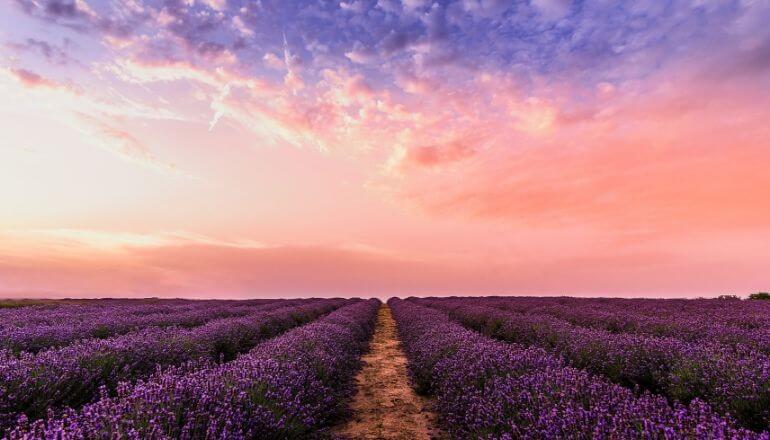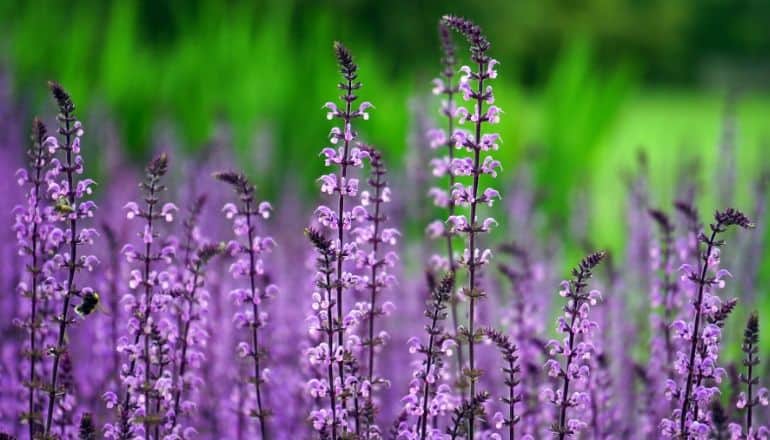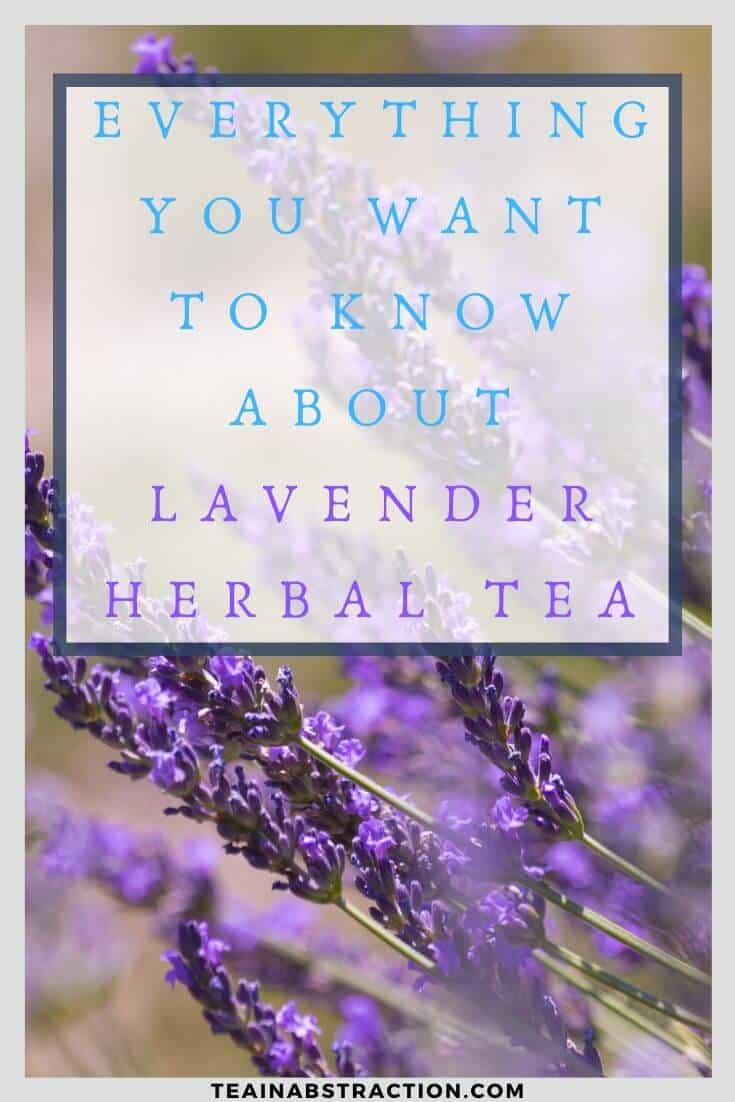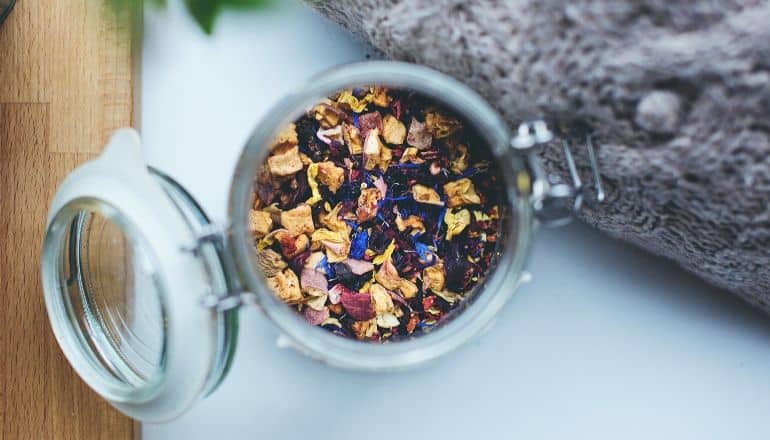*This Article May Contain Affiliate Links* See our Affiliate Disclosure for more Info
Lavender tea is one amazing flower herbal infusion. It’s an herbal tea that you should really consider adding to your tea drinking habits. And I’m going to convince you of exactly why that is.
From health benefits and side effects to how to make the perfect cup of lavender tea I’m going to lay it out for you in this article. But first, we need to answer one very simple question.
What Is Lavender Tea? Lavender tea is an herbal flower infusion derived from the Lavendula plant, a genus of dozens of plants in the mint family. Despite its name, Lavender tea is not a true tea as it does not come from the tea tree but it is acceptable to refer to herbal teas as teas.
So please join me as we take a journey into the world of lavender tea and find out exactly what makes it tick and what makes it such a wonderful herbal infusion.
I typically use Starwest Botanicals Organic Lavender Flowers(*affiliate link) for my loose-leaf lavender teas.
For a more convenient bagged option, I like to use Buddha Teas Organic Lavender Tea Bags(*affiliate link). That should just about do it for the affiliate links in this article. Carry on.

The Great Big Guide To Lavender Tea
10 Of The Best Lavender Herbal Tea Benefits
There are quite a few benefits you can get from drinking lavender tea. Here are 10 of the best ones that should make this wonderful herbal infusion that much more appealing to drink. Herbal teas like lavender are a great way to get antioxidants and other benefits without adding a lot of calories to your overall diet.
Tons Of Anti-Oxidants
Speaking of anti-oxidants, lavender herbal tea has a huge amount of them. Like most true teas and other herbal infusions, the plant-based nature of teas adds to the overall amount of anti-oxidants.
Anti-oxidants are critical in destroying free radicals that can harm your body. Anti-oxidants are an important part of a healthy diet(source), so adding new sources from your lavender tea is going to be very beneficial.
Lavender Herbal Tea Has A Calming Effect
Lavender tea’s most well-known benefit is its ability to calm a person who drinks it. Lavender has traditionally been used for this calming effect and has been the subject of studies that have looked into the effects of lavender on the nervous system that may contribute to this calming effect(source).
The calming effect of lavender was also studied for its aid in helping deal with anxiety disorders. A cup of Lavender tea makes a great relaxing tea to drink at the end of a long day
Lavender Tea May Help Improve Sleep
The calming aspect of lavender may be the reason that many people use lavender tea to help them get a better night’s sleep. The same study that looked at the calming effects of lavender Also looks at how lavender might help treat insomnia and improve sleep quality.
In part 4.4 of this study, just the aroma of lavender helped improve the overall sleep quality of many of the study participants. The scientific study seems to help reinforce some of the traditional beliefs about lavender and a good night’s sleep.
It May Help Strengthen Immune System
The antioxidants and antibacterial nature of lavender maybe a big reason why it can help strengthen or at least support your immune system. This study, in particular, has shown some of the benefits of lavender in helping maintain a healthy immune system.
It Has Some Anti-Bacterial Properties
The antibacterial nature of lavender helps destroy some of the bacteria and your body, particularly in your digestive tract making it’s very beneficial to deal with these harmful bacteria.
In this study, lavender essential oils were used to help control bacteria in pet turtles (source) Which I’m notorious for breeding bacteria that can be harmful to humans And to the turtles themselves. A lot of these antibacterial attributes are transferred over to the lavender tea and just not present in the lavender essential oil.
Lavender Tea Can Help Reduce Stress
Stress can have a devastating effect on your overall health(source). Therefore the calming effect of lavender and lavender tea can help reduce the stress on your body.
In fact, anything you can do the relieve stress is going to ultimately be pretty beneficial for your overall health. So having a nice cup of lavender tea to help relax at the end of the day and reduce the stress of the day is going to be very beneficial.
Some studies, like this one, have been conducted to see the effects of lavender essential oil on reducing stress in high-stress environments such as MRI procedures.
It Reduces Inflammation
Lavender has long been recognized as an anti-inflammatory. Anti-inflammatories foods and beverages are considered to be important to overall health. Reducing inflammation can help your body function better and more efficiently.
Anti-inflammatories in lavender can also help with joint pain and swelling that can start to occur as we age. However, more study needs to be done in order to determine the true value of lavender, particularly lavender essential oils, as an anti-inflammatory(source).
Lavender Herbal Tea May Aid In Cardiovascular Health
Inflammation can be a critical health issue with your heart and cardiovascular system(source). The anti-inflammatory nature of lavender and lavender tea can help reduce inflammation.
Lavender tea also contains no fat or cholesterol that may contribute to cardiovascular issues. Lavender and lavender tea is not a replacement for medical care with these issues, however. Always check with your doctor for medical advice.
Lavender Tea Aids Digestion
The calming effect of lavender tea might also help with your digestion by relaxing the muscles of your stomach. The contraction of these muscles can often lead to stomach pains and cramps so anything that can help alleviate them is going to be welcome for a lot of people. The Antispasmodic effect of lavender tea can also help reduce gas bloating And indigestion when consumed around mealtime.
Consuming and even just smelling lavender can help stimulate the production of bile and saliva in your digestive tract to help ease digestion and make the digestion of your food that much smoother.
It May Aid Respiratory Function
It may seem trivial but just breathing in the aroma and steam from the lavender tea is going to help with your respiratory system. If you are congested it can help alleviate that pressure just by opening up your nasal Pathways as you breathe in the lavender-infused steam. So it seems my habit of always breathing in a nice long breath of lavender tea before I drink it really pays off. Give it a try.
Lavender oil has also been studied for its ability to suppress allergens in your airway that may lead to inflammation(source).
Side Effects Of Lavender Tea
Lavender is generally considered to be a very safe plant to eat or consume in an herbal infusion. However, there can be side effects if you are allergic to Lavender or other plants in the mint family that is closely related to it.
As a result, you should always check with your physician before drinking any of these herbal teas to be sure that you are not going to have any negative side effects from them.
Some other common side effects of lavender include(source) constipation, headache, and skin irritation. There may be other side effects depending on the person drinking the lavender tea, but it is considered to be a very safe plant to consume for adults.
Need More Tea? Check Out Some More Of Our Articles…
What Does Lavender Herbal Tea Taste Like?
Lavender tea has a pretty complex flavor profile. The most prominent flavor know that you’re going to the tech is probably going to be the floral flavor of the lavender flowers. For a more in-depth look at the flavor profile of Lavender tea check out my article on the subject.
It’s really the most pungent aspect of the taste of lavender tea and it’s to be expected given how strong the floral aroma is of the lavender. It’s what makes lavender one of the more common fragrances to freshen the air in cars and houses.
But there’s also an earthy undertone in lavender tea that helps to ground the tea and keep the floral flavor from becoming so overwhelming that it becomes a distraction. the earthy tone is a little bit bitter but not so much that it makes the entirety of bitter infusion.
The last thing you’re going to notice about the flavor of lavender tea is it there’s a slight minty undertone to it. Lavender is part of the mint family so it’s to be expected that this minty flavor is there.
However, the mint flavor is not as prolific as it would be in peppermint tea or some of the other herbal mint infusions.
The flavor of the lavender tea can easily overwhelm some less flavorful herbal teas but in general, lavender herbal tea is a great herbal infusion to blend with a wide variety of other teas to enhance the flavor.
The Aroma Of Lavender Tea
The aroma of lavender herbal tea is pretty distinct. You have the wonderful floral Aroma of the lavender which transfers over to the tastes quite a bit. However, the aroma is much stronger than the taste once you steep your tea.
The tea smells a lot like the dried lavender does before you stupid in water. It’s very pungent very strong with a little bit of an earthy undertone to it.
How To Make Lavender Herbal Tea
Making lavender tea is pretty straightforward. Like most other herbal infusions it’s very tough to burn or over steep your team by using water that’s too hot or steeping it for too long. But there are a few rules that you can use to make sure that you get the best tasting cup of lavender tea possible.
Use The Right Water
When steeping your cup of lavender to you want to make sure that the water you use has a minimal impact on the flavor of the tea. That means you don’t want any water that heavy with minerals or metals and you don’t want any more of that is so distilled that we will leave your tea tasting flat.
Ideally, you want to use a good quality bottled spring water or a filter tap water if your tap water is safe and drinkable in the first place. Either one of these balanced water will give you the best tasting lavender tea that you can possibly have. To be sure to always start with the right water.
Find The Ideal Water Temperature
Water temp isn’t as crucial for steeping your lavender herbal tea as it is for many of the true teas especially something like green tea which is very susceptible to high temperature.
Still, I never like to use boiling water for steeping herbal teas with a few exceptions. For some root herbal teas, you really need to boil to get the most out of them.
But for the most part, I like to steep herbal infusions at a temperature around 10 or so degrees under the boiling point.
For lavender tea, the ideal temperature for me is around 205°F/96°C. You can use this wonderful conversion tool to find the temperature you need in the right measurement.
The Ideal Steep Time For Lavender Herbal Tea
Herbal teas usually take quite a bit longer to steep then your typical true tea, like green tea for example.
Lavender herbal tea is no exception. You want to steep the tea for at least 5 minutes to get the most out of your tea and preferably you want to approach the 10-minute Mark to get the best flavor out of your lavender tea.
You really don’t need to worry about over steeping your lavender tea because the lavender flower is pretty resilient and not easily corrupted by a long steep time.
Always experiment with the Steep time to get the right duration for your personal taste.
Amount Of Lavender Flowers To Use
The amount of lavender tea that you want to use for your cup of tea is really down to personal preference. I recommend starting with between 1 and 2 teaspoons of lavender flowers and experiment with the exact amount until you find what is best for you personally.
Likewise, I recommend using one lavender tea bag for one cup of tea but you can add more lavender tea bags if you want a stronger cup of tea. It really comes down to personal preference.
Tea Steeping Instructions Quick Recap
- Water temp should be around 205°F/96°C
- A 5 to 10-minute steep time should be ideal
- 1 to 2 teaspoons of lavender flowers or 1 lavender tea bag
- Use a good quality spring water or filtered tap water
- Always steep your lavender tea covered

Lavender Herbal Tea Related Questions
These are some of the most common related questions about lavender tea. Generally, the questions about lavender herbal tea are specifically about its nutritional aspects and how well it will fit into various diets.
Does Lavender Herbal Tea Contain Sugar?
Lavender herbal tea is naturally sugar-free. Even though there is a slightly sweet floral flavor to the tea it contains absolutely no sugar. Being sugar-free makes it a great beverage to use in place of very sweet and sugary drinks.
It’s especially helpful for anyone who needs to watch their sugar intake or is looking to cut back on sugar in their diet in general.
Does Lavender Tea Have Calories?
Lavender Tea’s Black of sugar is not the only great nutritional benefits of lavender herbal tea. It also has no calories to speak of.
Technically there may be a negligible amount of calories in a regular cup of tea but it’s not enough to warrant listing that amount of calories in the nutritional information for most lavender tea brands out there.
This makes lavender tea an ideal replacement for any calorie drink. Reducing the number of calories that you intake through your drinks as a great way to maintain or even lose weight(source).
Does Lavender Tea Have Caffeine?
Lavender tea is known as a very soothing and calming tea and one of the big reasons for this is that it has no caffeine in it. Unlike true tea, this flower herbal infusion is completely caffeine-free so you can drink any time of day without having to worry about upsetting your sleep rhythms or making you jittery or any of the other issues that sometimes come with drinking caffeine in excess.
This is probably one of the most popular related questions to lavender tea that I see. I think the issue is that when people CT they think of true teas that are full of caffeine and don’t realize that herbal teas are really herbal infusions and not teas at all. This question is so popular I dedicated an entire article to it, you can find that here.
Is Lavender Herbal Tea Ok For Fasting?
Another question that warranted a full article was “does herbal tea break a fast”. You can read my article here. The general consensus is that lavender herbal tea will not break your fast. It does not have enough calories to affect your body when it’s in a fasting state.
There are fasting purists who believe that when fasting you can only drink water so it could be argued that drinking tea during fast is not the best idea according to these people.
My take on it is that lavender herbal tea and most other teas are perfectly fine for fasting as long as you don’t add any calories to them in the form of sweeteners or milk or cream.
Does Lavender Tea Have Carbs?
Another popular question about lavender tea is “does it have any carbohydrates in it”. The good news is it does not have a measurable amount of carbohydrates in it. This makes it great for anyone on a diet that limits intake of carbs and there are a bunch of low carb diets out there right now.
It’s also a good option for the popular diet in our next question.
Is Lavender Herbal Tea Keto Friendly?
With lavender tea being carbohydrate-free it makes for a great option for anyone on a ketosis diet. Keto diets are incredibly popular right now and they are very strict about the number of carbohydrates you can consume on any given day.
Water is what you want to drink the most I want you’re on a keto diet but adding in a cup of lavender tea every now and again is going to give you a little bit of added flavor to your keto diet without adding any unnecessary cards.
Can You Grow Your Own Lavender For Tea?
Growing your own lavender is a wonderful idea. You can use the fresh lavender for a wide variety of cooking and home uses and, of course, you can brew some of the best lavender tea with it. You can also dry and store your homegrown lavender for a variety of uses as well.
You can even grow lavender indoors with sufficient sunlight. This makes for a great house plant for just about anyone, even apartment dwellers who have limited space(source).
What Else Can You Do With Lavender?
Lavender is a versatile plant. Not only is it great for making a soothing cup of flower herbal tea it can be used in a wide variety of recipes to enhance the flavor of the dish.
Lavender is also widely used in aromatherapy. You will also find it used as an air freshener and air purifier in homes(source). The plant can also be used as decoration either dried or as a garden plant.
The Lavender Tea Finish
That brings us to the end of our journey into the wonderful world of lavender herbal tea. This flower herbal tea is an incredible beverage on its own and it blends with so many other herbal teas and true teas.
It’s this versatility that will help make lavender tea much more popular in the mainstream in the coming years. While it certainly has its believers right now I think that it has a lot of room to grow as one of the more popular herbal infusions.
It may never reach the lofty Heights of chamomile tea but it doesn’t need to be one of the more popular herbal teas around. In fact, chamomile and lavender tea is already an incredibly popular lavender tea blend.
Whether you are drinking lavender herbal tea for the incredible health benefits or because it fits into your specific diet or because you just love the taste of lavender, you can rest easy knowing that this healthy and delicious drink is going to be a great part of your life going forward.
Thank you for stopping by and have a wonderful day.

